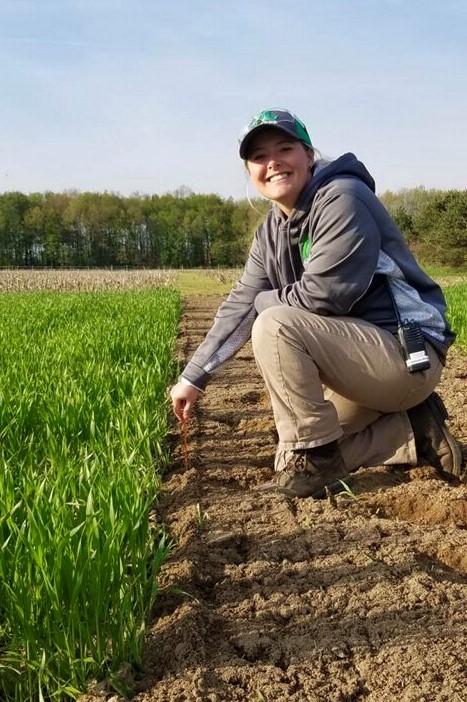Recent MSU crop and soil sciences grad pursues her Ph.D. at MSU
Student and alum Samantha Thompson researches pathogen resistance in fruit crops as a way to make a difference in the food we eat.

While she didn’t have a background in agriculture, Samantha Thompson was inspired by her grandma’s garden and nature.
“Growing up, my grandma’s garden inspired my love for plants, and my mother always encouraged me to get outside and enjoy the outdoors,” Thompson said. “Science related to agriculture interests me because it’s challenging and is a gateway to understanding all of the processes involved in growing the food that we eat.”
Her first connection with Michigan State University (MSU) was soccer camp as a preteen. Ever since then, Thompson said she has felt welcome at MSU, and it has become a great place for her to explore agricultural research opportunities and to consider academia as a possible career path.
Thompson graduated in December 2020 with a bachelor’s degree in crop and soil sciences through the Department of Plant, Soil and Microbial Sciences. She is currently working toward a postdoctoral degree in plant pathology and molecular plant sciences at MSU.
“Looking into the research and extension work that some of my undergraduate professors were involved in compelled me to work toward becoming a researcher,” Thompson said. “Research is demanding and takes a lot of time and effort. However, the end result of making a difference in the world of science is something that is invaluable to me.”
Name: Samantha Thompson
Hometown: Empire, Michigan
Why did you choose to study at Michigan State University?
I chose to study at MSU because of the variety of programs and the diversity of research topics conducted. When I was 12, I attended MSU’s soccer camp and immediately fell in love with the campus, the people and the community.
Why did you choose to study crop and soil sciences?

Crop and soil sciences became my main interest because of the captivating topics from past and present studies. These include soil fertility and health, management practices in both large and small production systems, soil biota and the importance of microbial communities in nutrient acquisition, and the importance of the soil as a biological, chemical and physical structure. The list goes on and on.
Working in STEM makes me a more critical thinker and teaches me to accept failure as part of the process. You build confidence as a decision maker when finding innovative solutions that may not always work out. I find that working in science has changed my perspective on academics. I’ve gained a focus on the scientific process without attachment to the results.
Who or what inspired your interest in crop and soil sciences?
I didn’t have any prior experience with agriculture before coming to MSU, but my professors and peers included me as a valued contributor to their teams. My interest in furthering my knowledge in agriculture ultimately led me down the path to understanding the importance of maintaining healthy soil for crop production.
What has been one of your best experiences within your academic program?
One of my best experiences within my academic program would have to be trotting through the MSU Agronomy Farm grounds with Dr. James Crum and my classmates where we dug up soil cores to identify the layers present in the soil horizon. Dr. Crum adding his humor into each class period when the topic may have not been the most intriguing to the entire class was an added benefit.
Have you had other experiences that have helped expand your skills? In what ways?
In the summer of 2019, I joined AgroLiquid’s team as a research intern at their North Central Research Station in St. Johns, Michigan. The team at AgroLiquid was extremely welcoming, and I was able to conduct one of my first research assignments measuring soil respiration in varying experimental plots. This project helped expand my skills in gathering and organizing data in research.
How did COVID-19 affect your experiences as a student?
COVID-19 limited my interaction with peers and my ability to experience hands-on laboratory experiments and procedures. The most difficult part was not seeing my professors in person. However, they all did a wonderful job transitioning into online courses.
What were some of the best things about being an MSU student?
Being a student at MSU has taught me the importance of working as a group to accomplish great things. Additionally, the Dairy Store grilled cheeses, fall football game days, exquisite professors and peers, and an all-around welcoming and accepting environment has proven that MSU is the place to be.
Any thoughts or advice for current students?
My best advice to current students is to never be afraid to ask questions. One of the most important things I’ve found as a student is to soak in all of the information that you can like a little sponge. Pursue what interests you the most and never be afraid of being different than others, because you will do great things.
What have you done following graduation?
As a recent graduate of the crop and soil sciences program at MSU, I was given the opportunity to pursue my Ph.D. in plant pathology and molecular plant sciences. My overall future plans are to continue my research in fungicide resistance of grape and blueberry crops with Dr. Timothy Miles and to work alongside my fellow researchers.
Resistance to fungicides limits growers on their ability to control certain pathogens in their fields. Developing new management strategies based on plant-pathogen interactions, developing efficient diagnostic tools and using current molecular and genetic technology to make fungicide resistance screening easier are some of our main goals.
In the first few months of my Ph.D., I’ve learned that keeping an obligate pathogen [powdery mildew of grape and strawberry] alive isn’t always a walk in the park, and that I can’t learn everything overnight.



 Print
Print Email
Email



